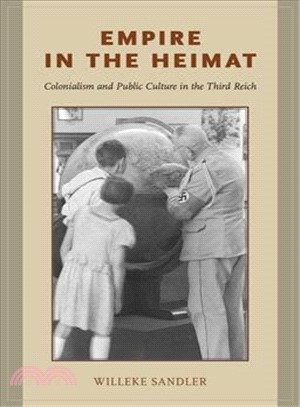Empire in the Heimat ― Colonialism and Public Culture in the Third Reich
商品資訊
ISBN13:9780190697907
出版社:Oxford Univ Pr
作者:Willeke Sandler
出版日:2018/09/06
裝訂/頁數:精裝/360頁
規格:24.1cm*15.9cm*1.9cm (高/寬/厚)
定價
:NT$ 3990 元優惠價
:90 折 3591 元
無庫存,下單後進貨(到貨天數約30-45天)
下單可得紅利積點:107 點
商品簡介
作者簡介
相關商品
商品簡介
With the end of the First World War, Germany became a "post-colonial" power. The Treaty of Versailles in 1919 transformed Germany's overseas colonies in Africa and the Pacific into League of Nations Mandates, administered by other powers. Yet a number of Germans rejected this "post-colonial" status, arguing instead that Germany was simply an interrupted colonial power and would soon reclaim these territories. With the Nazi seizure of power in 1933, irredentism seemed once again on the agenda, and these colonialist advocates actively and loudly promoted their colonial cause in the Third Reich.
Examining the domestic activities of these colonialist lobbying organizations, Empire in the Heimat demonstrates the continued place of overseas colonialism in shaping German national identity after the end of formal empire. In the Third Reich, the Deutsche Kolonialgesellschaft and the Reichskolonialbund framed Germans as having a particular aptitude for colonialism and the overseas territories as a German Heimat. As such, they sought to give overseas colonialism renewed meaning for both the present and the future of Nazi Germany. They brought this message to the German public through countless publications, exhibitions, rallies, lectures, photographs, and posters. Their public activities were met with a mix of occasional support, ambivalence, or even outright opposition from some Nazi officials, who privileged the Nazi regime's European territorial goals over colonialists' overseas goals. Colonialists' ability to navigate this obstruction and intervention reveals both the limitations and the spaces available in the public sphere under Nazism for such "special interest" discourses.
Examining the domestic activities of these colonialist lobbying organizations, Empire in the Heimat demonstrates the continued place of overseas colonialism in shaping German national identity after the end of formal empire. In the Third Reich, the Deutsche Kolonialgesellschaft and the Reichskolonialbund framed Germans as having a particular aptitude for colonialism and the overseas territories as a German Heimat. As such, they sought to give overseas colonialism renewed meaning for both the present and the future of Nazi Germany. They brought this message to the German public through countless publications, exhibitions, rallies, lectures, photographs, and posters. Their public activities were met with a mix of occasional support, ambivalence, or even outright opposition from some Nazi officials, who privileged the Nazi regime's European territorial goals over colonialists' overseas goals. Colonialists' ability to navigate this obstruction and intervention reveals both the limitations and the spaces available in the public sphere under Nazism for such "special interest" discourses.
作者簡介
Willeke Sandler is Assistant Professor of History at Loyola University Maryland.
主題書展
更多
主題書展
更多書展今日66折
您曾經瀏覽過的商品
購物須知
外文書商品之書封,為出版社提供之樣本。實際出貨商品,以出版社所提供之現有版本為主。部份書籍,因出版社供應狀況特殊,匯率將依實際狀況做調整。
無庫存之商品,在您完成訂單程序之後,將以空運的方式為你下單調貨。為了縮短等待的時間,建議您將外文書與其他商品分開下單,以獲得最快的取貨速度,平均調貨時間為1~2個月。
為了保護您的權益,「三民網路書店」提供會員七日商品鑑賞期(收到商品為起始日)。
若要辦理退貨,請在商品鑑賞期內寄回,且商品必須是全新狀態與完整包裝(商品、附件、發票、隨貨贈品等)否則恕不接受退貨。
























